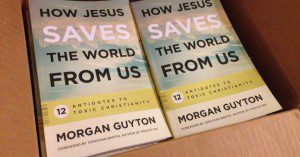Has Christianity turned toxic? I wish I could say that it hasn’t, that it is a religion full of adherents who freely pass onto others the grace, reconciliation and forgiveness so generously given to them. That adherents make statements seasoned with the humility of human limitations and unknown and unexamined prejudices. That adherents take seriously the admonitions of Jesus to love their enemies and seek to do good for them.
And I think these things happen all the time. But they rarely make the news. More, such attitudes and decisions do not build large churches and giant media presence and lucrative book contracts.
So today what passes for Christianity in the public eye has indeed become toxic.
On occasion, the lone and often ignored voice of the prophet calls out and says, “there is another way to do this.
 One such voice is Morgan Guyton. I’ve been following his blog for a number of years, often in deep envy at his ability to articulate his cries for change with both passion and solid scholarship. His first book, How Jesus Saves the World From Us: 12 Antidotes to Toxic Christianity, published by Westminster John Knox Press, has just come out.
One such voice is Morgan Guyton. I’ve been following his blog for a number of years, often in deep envy at his ability to articulate his cries for change with both passion and solid scholarship. His first book, How Jesus Saves the World From Us: 12 Antidotes to Toxic Christianity, published by Westminster John Knox Press, has just come out.
And he does indeed speak truth here while he calls us back to Jesus and away from a religious culture that has elevated things like performance, terror, correctness and leadership over far more biblical values such as worship, honor, communion, and servanthood.
The section that I found particularly compelling concerned the contrast between the toxic value of “clean” versus the more biblical value of “empty.”
Guyton writes of how clutter, the accumulation of too much disordered stuff, can genuinely hurt us. Certainly it is so in our physical spaces, as cluttered houses make it nearly impossible to get rid of potential allergens, for example. He also speaks of it in our spiritual lives where our insecurities and hidden agendas create so much anxiety that our irritability spills over in our treatment of others.
The toxic agenda, however, puts the focus on clean not uncluttered. Clean, in Guyton’s experience and in my own as well, means keeping people isolated from possibly polluting influences. Instead of emptying ourselves of the impediments to the free movement of the Holy Spirit, we load ourselves with tight rules that emphasize outward purity and rejection of any possible influence that might sully the mind or body.
But the emphasis ignores that fact that the mind and body have all the internal capabilities necessary to carry out the sullying process without restraint. So all may be outwardly clean but inwardly disastrously full of clutter.
Morgan mentions Bill Gothard, the now disgraced founder of the Institute of Basic Life Principles. It is from his rigid teachings on outward cleanliness that the now infamous reality TV Duggar family based their lives.
God only knows what other damage done will eventually surface for the many younger children of this family with 19 offspring. What we do know is the oldest son, living through possibly the cleanest upbringing ever, molested four sisters and a babysitter and then became addicted to porn and paid for and engaged in rough sex with prostitutes.
His porn/prostitute life took place all while routinely impregnating his young, innocent and utterly helpless wife to the tune of four babies in four years and speaking with great forcefulness on a widely promoted public platform about the importance of family values.
I will write personally here. I used to work for Bill Gothard, although, thanks be to God, not directly so I never had to fight off his many seductions of young women. However, his teachings of impregnable male headship and total female submission formed the basis for my first marriage.
That marriage ultimately ultimately crashed and burned, not because either of us were bad people, but because it meant I had to completely disappear as a sentient human being to keep it alive. It very nearly ended with my suicide. I finally found the courage to choose divorce, but it took a terrible toll on my family with repercussions still reverberating more than 20 years later.
Guyton offers a glorious alternative: “To be truly free means to have a heart that has been emptied of spiritual clutter–all the cravings, anxiety, paranoia and impulsivity that make us restless and miserable, even when we say we’re having fun” (p. 38). And “The goal is not to keep ourselves perfectly clean and absent of any scars or smudges; the goal is to be emptied enough of our self-preoccupation that we can lose ourselves in God. If you are preoccupied with staying clean, you’ll still preoccupied with yourself.” (p. 41)
We live in a messy world. If we want to be ministering in that world, we will get messy ourselves. As Guyton says, “God wants people who hearts that are emptied enough that they are ready to go out and get dirty doing justice in a mess world.”
Read the book. It’s worth the time.













